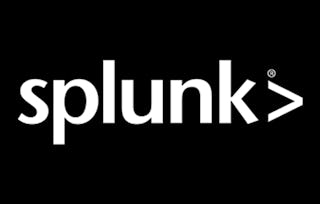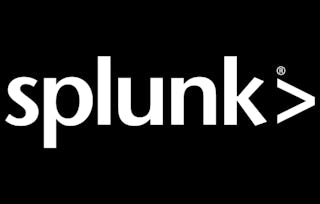This course helps you understand the basics of machine data. You will learn about Splunk components, its basic functions, and be introduced to apps, which becomes your workspace. It teaches you how to navigate Splunk, get you familiar with search anatomy to run searches using fields and basic commands.

Splunk Search Expert 101

Splunk Search Expert 101
This course is part of Splunk Search Expert Specialization

Instructor: Splunk Instructor
13,581 already enrolled
Included with
225 reviews
What you'll learn
Investigate data using Splunk Search Processing Language (SPL) and create searches, reports, dashboards, and visualizations.
Utilize temporary and persistent fields in searches and enrich data with fields from other data sources.
Create, managed, and schedule reports and alerts to automate processes and respond to incidents as they occur.
Visualize data to create charts, graphs, and maps and use visual formatting commands to curate appearance.
Skills you'll gain
- Business Intelligence
- Security Information and Event Management (SIEM)
- Query Languages
- Data Science
- Big Data
- Incident Response
- Data Processing
- Data Analysis
- Business Analysis
- Data Visualization Software
- Data Transformation
- Analysis
- Ad Hoc Reporting
- Dashboard
- Splunk
- Skills section collapsed. Showing 9 of 15 skills.
Details to know

Add to your LinkedIn profile
4 assignments
See how employees at top companies are mastering in-demand skills

Build your subject-matter expertise
- Learn new concepts from industry experts
- Gain a foundational understanding of a subject or tool
- Develop job-relevant skills with hands-on projects
- Earn a shareable career certificate

There are 5 modules in this course
This eLearning module introduces students to what machine data is, and how Splunk can leverage operational intelligence to investigate and respond to incidents in their organizations.
What's included
3 videos2 readings
This eLearning module teaches students how to use Splunk to create reports and dashboards and explore events using Splunk's Search Processing Language. Students will learn the basics of Splunk's architecture, user roles, and how to navigate the Splunk Web interface to create robust searches, reports, visualizations, and dashboards..
What's included
8 videos2 readings1 assignment
This module is for users who want to learn about fields and how to use fields in searches. Topics will focus on explaining the role of fields in searches, field discovery, using fields in searches, and the difference between persistent and temporary fields. The last topic will introduce how fields from other data sources can be used to enrich search results.
What's included
5 videos3 readings1 assignment
This eLearning module teaches students how to use scheduled reports and alerts to automate processes in their organization. Students will create, manage, and schedule reports and alerts, and use alert actions to further respond to incidents as they occur.
What's included
6 videos3 readings1 assignment
This eLearning module teaches students how to create visualizations in Splunk, using Splunk's Search Processing Language as well as the Splunk Web interface. Students will learn commands that allow data to be displayed on charts and graphs, transform geographic data into maps, create single value visualizations, and use Splunk's visual formatting options to change the look of statistical tables.
What's included
5 videos2 readings1 assignment
Earn a career certificate
Add this credential to your LinkedIn profile, resume, or CV. Share it on social media and in your performance review.
Instructor

Offered by
Explore more from Security
 Status: Free Trial
Status: Free TrialSplunk Inc.
 Status: Free Trial
Status: Free TrialSplunk Inc.
Why people choose Coursera for their career

Felipe M.

Jennifer J.

Larry W.

Chaitanya A.
Learner reviews
- 5 stars
75.11%
- 4 stars
16.44%
- 3 stars
4.88%
- 2 stars
2.22%
- 1 star
1.33%
Showing 3 of 225
Reviewed on May 12, 2022
Faltou arquivos utilizados no splunk para praticar...
Reviewed on Nov 2, 2023
This is a good course to familiarize yourself with the fundamentals of Splunk as a user of the software for log/data analysis.
Reviewed on Jun 20, 2023
The shared content was extremely useful. It is quite a hard topic though, so I'd reckon new learners to pay attention to details and practice as much as you can.

Open new doors with Coursera Plus
Unlimited access to 10,000+ world-class courses, hands-on projects, and job-ready certificate programs - all included in your subscription
Advance your career with an online degree
Earn a degree from world-class universities - 100% online
Join over 3,400 global companies that choose Coursera for Business
Upskill your employees to excel in the digital economy
Frequently asked questions
To access the course materials, assignments and to earn a Certificate, you will need to purchase the Certificate experience when you enroll in a course. You can try a Free Trial instead, or apply for Financial Aid. The course may offer 'Full Course, No Certificate' instead. This option lets you see all course materials, submit required assessments, and get a final grade. This also means that you will not be able to purchase a Certificate experience.
When you enroll in the course, you get access to all of the courses in the Specialization, and you earn a certificate when you complete the work. Your electronic Certificate will be added to your Accomplishments page - from there, you can print your Certificate or add it to your LinkedIn profile.
Yes. In select learning programs, you can apply for financial aid or a scholarship if you can’t afford the enrollment fee. If fin aid or scholarship is available for your learning program selection, you’ll find a link to apply on the description page.
More questions
Financial aid available,



